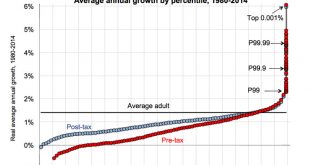[Noah] Smith is keen to refute the ‘mixed economy’, anti free trade ideas that have been sneaking into mainstream economics since the Great Recession, namely that ‘neo-liberalism’ and free markets are bad for living standards. Instead, a little dose of protectionism on trade (Rodrik) and state intervention and regulation (Kwak) helps capitalism to work better. But no, says Smith. Neoliberalism works better. He cites China’s growth phenomenon as his main example! In China, “the shift...
Read More »Chris Dillow — The rich as heroes
Was Ayn Rand just the expression of a cultural syndrome and an amplification of the Horatio Alger myth? Have new cultural myths been born to suit the historical transition from feudalism to liberalism, in the West at least? Are the conflicts between liberalism and traditionalism the conflict of different myths characteristic of incompatible worldview? How is it that many conservatives find no contradiction between economic liberalism and social and political traditionalism? Is...
Read More »Eli Cook — The Pricing of Progress and the Origins of GDP
The key element that distinguishes capitalist societies from previous forms of social organization is not the existence of markets or money but rather capital investment, the act through which basic elements of society and life—including natural resources, technological discoveries, cultural productions, urban spaces, educational institutions, human beings, and the nation-state—are transformed (or “capitalized”) into income-generating assets valued and allocated in accordance with their...
Read More »Zac Tate — Capitalism is losing support. It is time for a new deal.
The financial crisis has led many to question the legitimacy of capitalism. The verdict, 10 years on, has not been favourable. In an opinion poll by YouGov, three-quarters of German adults, two-thirds of Britons and over half of Americans believe that, “the poor get poorer and the rich get richer in capitalist economies”. Their sense of injustice is not only a reaction to bank bailouts, years of austerity and corporate scandals. The challenge is fundamental. There is a growing awareness in...
Read More »Daniela Cobos — Millennials Have Had It with Capitalism, New Survey Reveals
Bernie appears to have had an impact. To obtain this information, the research and data firm YouGov surveyed 23,000 people aged 16 and over. Two of the survey’s findings included that 59 percent of total Americans would rather live in a capitalist country, with 34 percent preferring a socialist nation.When focusing on millennials, the survey revealed 44 percent of those surveyed would rather live in a socialist nation, compared to 42 percent who would prefer a capitalist country. The...
Read More »Asher Schechter — UN Study Warns: Growing Economic Concentration Leads to “Rentier Capitalism”
Earlier this year, a Stigler Center paper by Luigi Zingales [Faculty Director of the Stigler Center and one of the editors of this blog] argued that market concentration can lead to a vicious circle, in which companies use market power to gain political power that in turn allows them to gain more market power, and vice versa. Zingales called this the “Medici vicious circle”: “Money is used to gain political power and political power is then used to make more money.”A new UN report shows...
Read More »Richard D. Wolff — The Political Economy of Obama/Trump
US capitalism is again careening down blind alleys. Earlier it had crashed into the Great Depression from 1929 to 1933 before lurching into the New Deal. After 1945 it concentrated on rolling back the New Deal until it turned sharply to neoliberalism and “globalism” in the 1970s. That provided the comforting illusion of a few decades of “prosperous normalcy.” When the second major crash in 75 years hit in 2008, it exposed the debt-dependent reality of those decades. It also sent capitalism...
Read More »Michael Roberts Blog — Xi takes full control of China’s future
And American imperialism is scared. U.S. Commerce Secretary Wilbur Ross has described the plan as an “attack” on “American genius.” In an excellent new book, The US vs China: Asia’s new cold war?, Jude Woodward, a regular visitor and lecturer in China, shows the desperate measures that the US is taking to try to isolate China, block its economic progress and surround it militarily. But she also shows this policy is failing. China is not accepting control by foreign multi-nationals; it is...
Read More »David F. Ruccio — Balance this!
First, we have to understand, the U.S. trade deficit has risen and U.S. manufacturing output has fallen not because of the “blind forces” of international trade. For decades now, U.S. corporations have decided to increase their profits by a combination of shifting production to other countries and automating many of the production processes that remain in the United States. And they’ve left the American working-class behind. Second, there’s no guarantee that increasing manufacturing output...
Read More »Raúl Ilargi Meijer — Is Capitalism Dead or Merely Dying?
Maldistribution. Symptom or cause? A market ideology that causes widespread misery has no future. The Automatic EarthIs Capitalism Dead or Merely Dying? Raúl Ilargi Meijer The transition from the age of hunting-gathering to the agricultural age wrought a drastic social, political l and economic transformation, as did the transition from the agricultural age to the industrial age. So it can be safely assumed that the transition from the industrial age to the information age will also...
Read More » Heterodox
Heterodox

